University of California San Francisco
Give to UCSF-
-
Two UCSF Researchers Awarded Funding for Work on Pediatric Oncology
Two UCSF faculty members are among three promising young researchers nationally recognized for their work in pediatric oncology. UCSF’s Adam de Smith, PhD, and Kyle Walsh, PhD, will share a $1.35 million award with Duke University’s Lisa Crose, PhD.

-
My Lab: Dissected
Two major factors determine whether you get cancer – your genes and what you have been exposed to in the environment, says Allan Balmain, PhD, co-leader of UCSF’s Cancer Genetics Program.
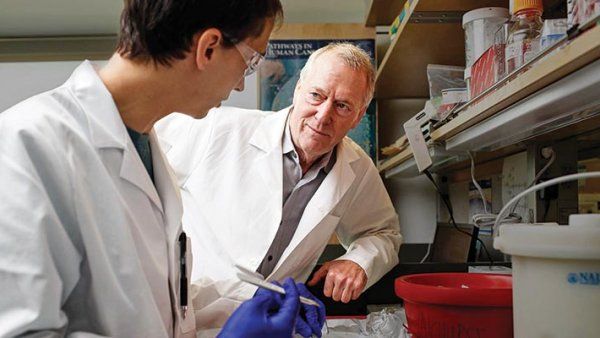
-
UCSF Medical Center Opens $1.5 Billion, “Next Generation” Hospital Complex at Mission Bay Campus on Feb. 1, 2015
After more than 10 years of planning and construction, UCSF Medical Center at Mission Bay will open Feb. 1, 2015 on UCSF’s world-renowned biomedical research campus.

-
UCSF to study early menopause vs. preventive cancer surgery risks
-
Electrical Scalp Device Can Slow Progression of Deadly Brain Tumors
-
Nonsmokers In Automobiles Are Exposed to Significant Secondhand Smoke
Nonsmokers sitting in an automobile with a smoker had markers of significantly increased levels of carcinogens, indicating that secondhand smoke in motor vehicles poses a potentially major health risk.

-
E-cigarette use triples among high schoolers
-
Bridging the Gap in Precision Medicine
UCSF is unveiling a comprehensive cancer genetic testing program integrated with patients' electronic medical records, a major milestone in bringing precision medicine into everyday practice.

-
New Software Platform Bridges Gap in Precision Medicine for Cancer
UCSF has unveiled a new cloud-based software platform that significantly advances precision medicine for cancer.

-
Environmental Carcinogens Leave Distinctive Genetic Imprints in Tumors
Genetically engineering tumors in mice, a technique that has dominated cancer research for decades, may not replicate important features of cancers caused by exposure to environmental carcinogens, according to a new study led by UCSF scientists.

-
Childhood Cancer Expert Champions Innovative Treatment at New Hospital
Physicians at the new UCSF Benioff Children’s Hospital San Francisco are dedicated to cutting-edge research that helps minimize invasive treatment for very sick children.

-
Radiation Exposure Linked To Aggressive Thyroid Cancers
For the first time, researchers have found that exposure to radioactive iodine is associated with more aggressive forms of thyroid cancer, according to a careful study of nearly 12,000 people in Belarus who were exposed when they were children or adolescents to fallout from the 1986 Chernobyl nuclear power plant accident.

-
California’s Tobacco Control Efforts Losing Steam, Finds UCSF Report
California’s position as a leader in tobacco control is under threat, according to a new report from the UC San Francisco Center for Tobacco Control Research and Education.

-
Genetic Variant Protects Some Latina Women from Breast Cancer
An international research collaboration led by UCSF researchers has identified a genetic variant common in Latina women that protects against breast cancer.

-
Human Cancer Prognosis Is Related to Newly Identified Immune Cell
A newly discovered population of immune cells in tumors is associated with less severe cancer outcomes in humans, and may have therapeutic potential, according to a new UCSF study.

-
Ziegler Wins 2014 Burkitt Medal
UCSF's John Ziegler, MD, MSc, has won the 2014 Burkitt Medal, an award given by Trinity College Dublin to recognize people who embody “integrity, compassion and dedication."

-
Peter Walter: ‘This Honor Really Belongs to All of Us’
More than a hundred colleagues, family and friends gathered Monday to celebrate Peter Walter, the recipient of the 2014 Lasker Basic Medical Research Award, one of the most prestigious honors in science and medicine.

-
Parents Persuade Calif. Senate to Shed Light on Children’s Cancer
Juliana's Journey Foundation - established in honor of two-and-a-half-year-old Juliana Peña, who passed away in 2012 from brain cancer - recently gave $15,000 to UCSF's Kate Matthay, MD, to develop treatments for neuroblastoma.

-
Kelley Receives Leadership Award from the National Cancer Institute
Katie Kelley, MD, a gastrointestinal oncologist at UC San Francisco, has received the 2014 Cancer Clinical Investigator Team Leadership Award from the National Cancer Institute (NCI).

-
New Hospital Embraces Next Frontier of Cancer Treatment
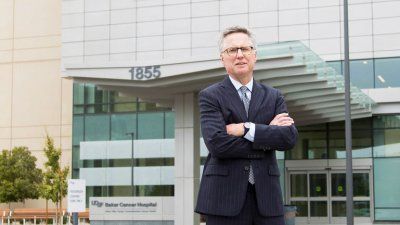
-
Do Gut Bacteria Rule Our Minds?
It sounds like science fiction, but it seems that bacteria within us – which outnumber our own cells about 100-fold – may very well be affecting both our cravings and moods to get us to eat what they want, and often are driving us toward obesity.
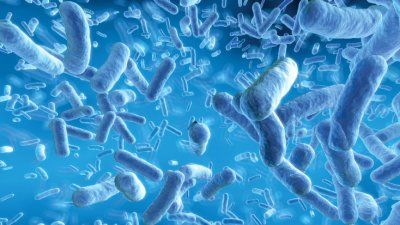
-
Cancer Categories Recast in Largest-Ever Genomic Study
New research partly led by UCSF-affiliated scientists suggests that one in 10 cancer patients would be more accurately diagnosed if their tumors were defined by cellular and molecular criteria rather than by the tissues in which they originated.
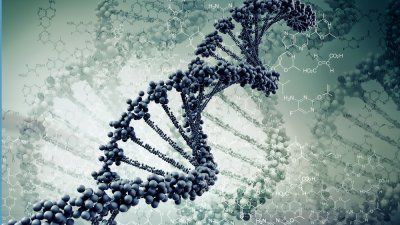
-
UCSF Medical Center Ranked Eighth Nationally By U.S. News
UCSF Medical Center is among the nation's premier hospitals for the 13th consecutive year, ranking as the eighth best hospital in the country according to U.S. News & World Report.
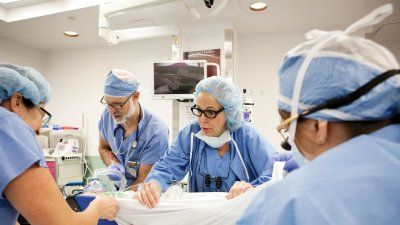
-
UCSF Commentary: Tweet Your Way to Better Health
Twitter and other social media should be better utilized to convey public health messages, especially to young adults, according to a new analysis by researchers at UC San Francisco.

-
How a Thick “Sugar Coating” on Cells May Drive Aggressive Cancers
UCSF scientists have shown that cancer-induced structural changes in a sugary coating ensheathing cells can promote mechanical interactions that fuel tumor growth and metastasis.

-
Targeting a Key Driver of Cancer
The Ras protein is one of the most common and deadly drivers of cancer, yet it has eluded any drug therapies for decades. Scientists are getting close to changing that.
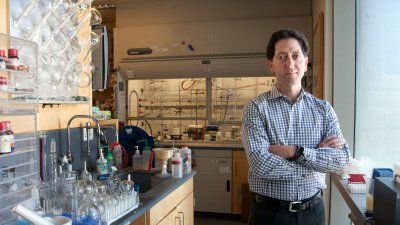
-
Rate of smokeless tobacco use in U.S. unchanged: CDC
-
For cancer specialists, disease can make them better doctors
-
Long telomeres may mean higher cancer risk, UCSF team says